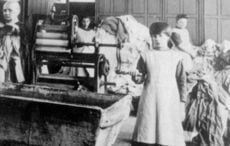DESPITE the steroids and other distractions, the summer of 2007 has been a good time to be a baseball fan. Like it or not, Barry Bonds broke the home run record, the most hallowed mark in all of American sports. The Yankees (my team) have slowed a bit, but they played great ball in July. Alex Rodriguez also hit his 500th home run, while across town pitcher Tom Glavine won his 300th game for the New York Mets.
Right now, if you really want to spend some time thinking about great baseball summers, take a stroll uptown to the Museum of the City of New York at Fifth Avenue and 103rd Street in Manhattan. They are currently running an exhibition called "The Glory Days: New York Baseball 1947-1957."
"The decade between 1947 and 1957 was the golden age of baseball in New York City," the museum notes. "With three major league teams - the Yankees, the Brooklyn Dodgers, and the New York Giants - at least one of whom played in the World Series every year except 1948 . . . New York was the undisputed baseball capital of the nation. But more than that, New Yorkers lived and experienced baseball in their town in a way never to be repeated again."
This exhibition -- along with an article I wrote for the latest edition of Irish America magazine about baseball's Irish stars from the late 19th century -- got me thinking about one of the most infamous Irish Americans in baseball history, Brooklyn Dodgers owner Walter O'Malley.
This year marks the 50th anniversary of the Dodgers move to Los Angeles. A generation of New York baseball fans has never been the same.
To Irish Brooklynites such as Pete Hamill and his brothers (who have spoken of this topic on more than one occasion), O'Malley had done the unforgivable. Hamill and fellow journalist Jack Newfield once listed the three greatest villains of the 20th century as Hitler, Stalin and Walter O'Malley.
On the occasion of the 50th anniversary of the Dodgers move, however, it might finally be time to forgive O'Malley, a Bronx native raised in Queens. Increasing evidence shows that Brooklyn and baseball were probably going to part ways anyway.
Furthermore, a recent book indicates that O'Malley was far from the worst character in this New York tragedy.
First, it's long been noted that attendance at Ebbets Field had been dropping, even though the Dodgers were a good team. Furthermore, Los Angeles offered a very sweet deal to O'Malley.
But there's a whole lot more.
Another one time Irish Dodger fan, Robert E. Murphy, recently noted that while O'Malley and the Dodgers have always received the most criticism, the New York Giants - who played in Manhattan's Polo Grounds -- are deserving of some blame.
"Fifty years would be time enough in the national memory to qualify the Dodgers' departure from Brooklyn as a mythical event, were it not that it actually happened. I know it did; I was one of the kids it happened to," Murphy wrote in a recent New York Times article entitled "The Real Villain of New York Baseball."
Murphy continues, "It turns out that (Giants owner Horace) Stone-ham was much more coolly committed to moving from the city than was the infamous O'Malley."
O'Malley struggled mightily to keep the Dodgers in Brooklyn. In fact, 50 years ago this week, when it was already known that the Giants would be leaving the Polo Grounds, O'Malley was still trying to find a way to keep the Dodgers in Brooklyn.
He had proposed an ambitious domed stadium and looked at building a stadium in Flushing Meadows, Queens, where the Mets eventually built Shea Stadium when they became a team in the early 1960s.
According to author Robert Shapiro and his book The Last Good Season, it was New York's development czar Robert Moses who would not help accommodate many of O'Malley's proposals, including a plan for a new stadium in downtown Brooklyn where, ironically, a basketball stadium is slated to rise in the near future.
So, maybe it's time to give Walter O'Malley a break. Incidentally, the family is still in the baseball business.
Son Peter O'Malley has been instrumental building fields in Ireland, attracting not just Irish-born players but Irish Americans as well. It's a good bet he will not relocate any of the fields.
(Contact Tom at [email protected].)




Comments